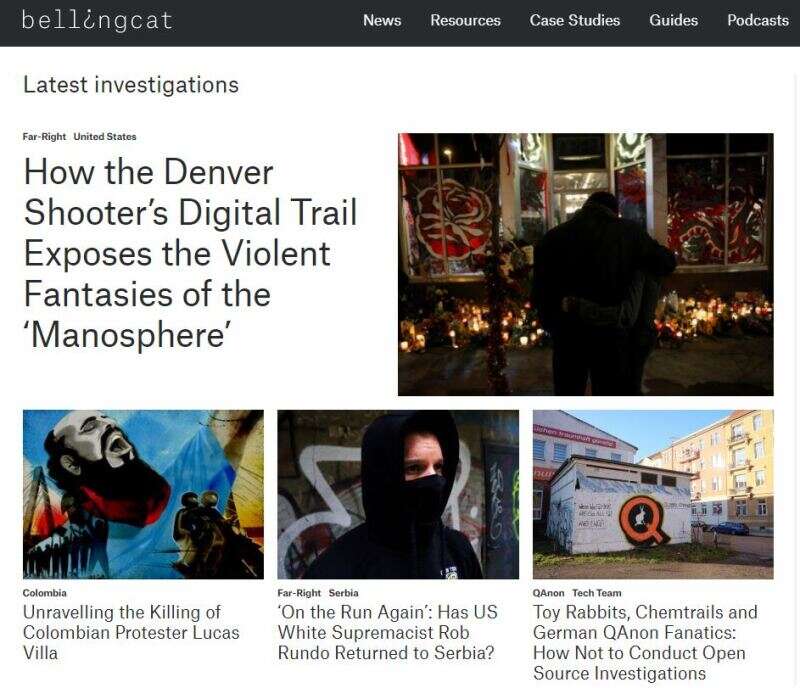
Late last year, Bellingcat founder Eliot Higgins was on a staff retreat when his hotel room’s air conditioning started to create a terrible stench. His first thought? Could Russian spies be behind it.
“If something odd happens in your life, there’s always this extra element that you ask yourself ‘Did that happen because of the Russian intelligence services?’,” he explains. It’s not as crazy as it sounds. The Russian government has a history of petty punishments for opponents, even allegedly resorting to creating fake sex tapes of US officials and getting people to defecate on the car of an opposition leader. Some are more serious of course. Higgins has said before that he no longer eats hotel food to avoid any risk of being poisoned.
And Higgins certainly has got on the bad side of the authoritarian Putin regime. After a string of ground-breaking stories, from tricking Russian security officers into admitting their role in the attempted assassination of Alexei Navalny to famously identifying the perpetrators who shot down flight MH17 and their links to the Russia, Bellingcat and its staff were given ‘foreign agent’ status in an attempt to shut down their reporting.
“It’s a clear attempt at kind of stifling free speech and censorship,” he explains in a call on encrypted messenger app Signal. “And is part of a broader crackdown on kind of independent kind of journalism and activists and basically freedom of speech inside Russia.”
Looking at the reporting Bellingcat does, it would be easy to mistake them for the kind of journalists you see in spy thrillers; doggedly exposing the espionage and hidden affairs of evil regimes. It’s even where the organisation’s name comes from – Higgins took it from an old fable, “belling the cat”, where a group of mice plan to stick bells on their hated neighbourhood cat, so they would know when it was coming to eat them. The simple lesson for Higgins; the powerful and dangerous shouldn’t be allowed to move in silence.

The primary weapon for Bellingcat in that fight is open-source intelligence (often called OSINT) – or information that can be gathered from open and publicly available sources. While it technically includes media, government data and any other public works, its mainstay for investigators is the never-ending stream of internet data, from cell phone videos and photos to social media and satellite imagery.
Higgins thinks a lot of what makes Bellingcat special comes from the fact that he isn’t a journalist himself. “Because I don’t come from a journalism background, I’ve kind of looked at it in a way that doesn’t tie it to one particular field of expertise,” he explains. “And so I don’t have this kind of way of looking at journalism as something that has to be separate from advocacy or activism.”
Higgins himself first fell into the world of open source intelligence in 2012. While caring for his child at home, he began blogging about the Syrian Civil War under the pseudonym Brown Moses. His self-taught hobby of analysing Syrian weaponry helped prove the use of barrel bombs by the government and exposed the illicit shipping of Croatian-made weapons into the conflict zone with help from the US government. Both stories went on to receive major coverage in the news, and eventually helped lead to his establishment of Bellingcat in 2014.
That background means he can take an unorthodox approach to information gathering. For some Russian stories in the past he has bought data off the black market.
Bellingcat can also blur the line between journalism and activism.
He says a recent focus for the organisation has been making its work accessible for lawyers and prosecutors, including multiple projects with the Global Legal Action Network to make open source data more useful in courtrooms and the UN.
Higgins sees Bellingcat’s journalism as a means to an end towards justice and accountability.
“If someone’s filming a war crime on the ground, they’re not sticking it on YouTube, because they think they’ve got a piece of entertainment for someone or for a good blog post somewhere,” explains Higgins. “They are filming it, because they hope someone will take action.”
Another way that Bellingcat differs from other journalistic outlets is its use of volunteers. Higgins doesn’t see his readers or followers as just “receivers of information” but potential investigators themselves – especially as almost all the data it uses is open source, so anyone can access and analyse it.
“When you think about kind of involving your audiences at traditional news organisation, it generally involves people arguing on comments sections or something… but there’s different ways to engage,” he explains. “There’s lots of people out there with a lot of knowledge and obsessions about certain areas, but not from traditional kind of backgrounds, much like myself.
“I think if you can find those people harnessing their brain power, they can contribute a lot more than what you would consider a kind of more traditional expert.”
As just one example of the value of ‘citizen journalism’, he cites a recent investigation into the rioting and protests in Kazakhstan where he asked followers to use open-source flight data to track private jets that were leaving the country. An attempt to track en-masse, as he calls it, the exodus of “the great and wealthy of Kazakhstan”.
The most recent polling from PR firm Edelman found that 67% of people globally said that they believe that journalists and reporters purposely try to mislead people by saying things they know are false or exaggerated. Just 35% of British people and 39% of Americans said they trusted the media.
As Higgins sees it, by taking reporting out of ivory towers and having it be shaped by the very people who want to read it can help rebuild that trust.
By using openly-accessible data, it means Bellingcat’s reports can be checked and verified by its readers. When you combine that with an ability to make sure that reporting can have consequences – be they legal or just in the court of opinion – Higgins sees it as a way to build a virtuous cycle.
“They can trust the information that’s published because it is totally transparent,” says Higgins. “And if all that can be repeated time and time again, I think it starts creating a sense of government accountability, alongside making people feel like journalism actually has more purpose now because they see this accountability happening.”
Bellingcat global expansion plans
Higgins has high hopes for the future of Bellingcat. First off, they’re branching out from Europe to become more global, particular in Latin America. The site also plans to make its work available in a broader range of languages.
A new Russia team is being established led by Christo Grozev, the Bulgarian investigative journalist behind much of Bellingcat’s ongoing Russian reporting.
The full-time team working for the organisation is set to grow too, giving it a total of 30 staff.
It is also looking at broadening its reach on social media from its mainstay of Twitter to apps like Tiktok – as it would allow the site to reach a broader range of people to assist in with open-source work.
Bellingcat has also launched a production team to produce more documentaries and podcasts – both of which have proved both popular and award-winning for the team in the past.
Bellingcat is reliant on a mixture of public donations, government grants, workshop and education fees and everything in-between. As Higgins explains, the current balance is about 50% grants, 30% from workshops and 20% from donations, appearance fees and other sources of income.
Higgins says that since Bellingcat’s first £50,000 Kickstarter in 2014 the organisation roughly doubled its fundraising every year until the pandemic. Now he says they have around £2m a year to spend on journalism.
Other journalism outlets persuing OSINT
When asked about open source journalism outside Bellingcat, Higgins jumps immediately to the New York Times visual investigation team and BBC Africa Eye (established in 2018).
Africa Eye’s first major open source investigation went viral after it used social media data, satellites and the angle of shadows to work out the location and perpetrators of a filmed incident where Cameroon soldiers executed women and children accused of being part of a jihadist group.
Higgins reckons that Bellingcat trains around 1,000 people a year in open-source journalism techniques. But he says much of the media is yet to embrace “the opportunities that have been presented to it through open source”.
Higgins believes that Western Governments also need to grasp the nettle and start taking action in the murky worlds Bellingcat investigates.
“I think there just needs to be kind of a recognition of the kind of people that we’re dealing with. We’re nearly up to 20 attempted and successful assassinations that we’ve identified… And this isn’t just about journalism,” he explains. “It’s also about the way Western governments have almost become run by a bunch of middle managers who have no real kind of political philosophy. They have no kind of stomach for anything that’s more complex than trying to get through the next crisis.”
Email pged@pressgazette.co.uk to point out mistakes, provide story tips or send in a letter for publication on our "Letters Page" blog
